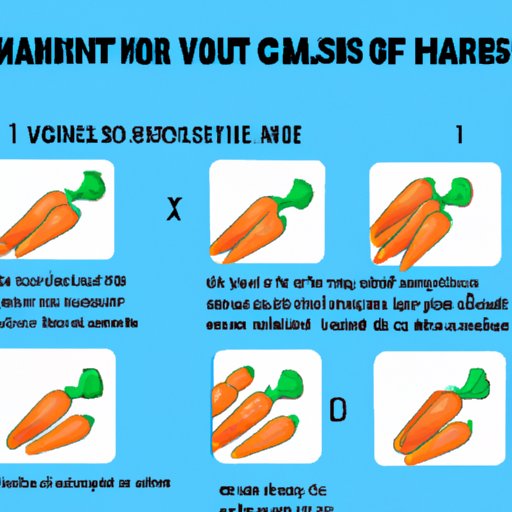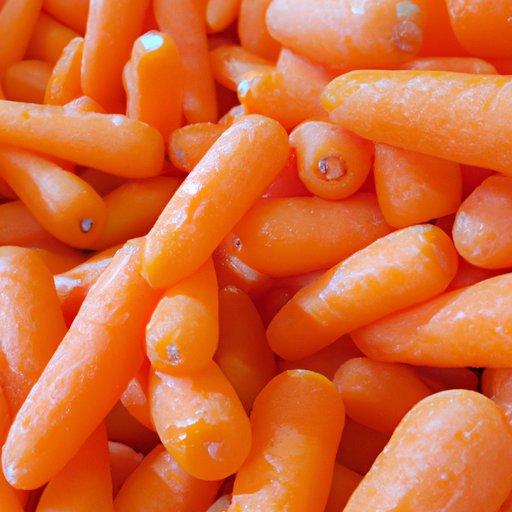Introduction
Snacking has become an increasingly popular part of our daily lives. With more and more people leading busy lifestyles, convenience is key when it comes to choosing snacks that are both tasty and nutritious. Baby carrots have become a popular go-to snack for many due to their crunchy texture and sweet flavor. But are they really as healthy as they seem?
What Are Baby Carrots?
Baby carrots are small, thin carrots that have been cut down from larger carrots. They are typically sweeter than regular carrots due to their higher sugar content. Although baby carrots are often thought of as a “health food”, they are actually a processed food product. Baby carrots are usually peeled, washed, cut, and packaged for convenience. Despite being processed, baby carrots still contain a number of health benefits.
Overview of Health Benefits
Baby carrots are a good source of dietary fiber, vitamins, and minerals. They are low in calories and fat, making them an ideal snack choice for those looking to lose weight or maintain a healthy weight. Additionally, baby carrots are rich in antioxidants, which can help reduce inflammation, protect against cancer, and improve overall health.
Investigating the Nutritional Benefits of Baby Carrots
Let’s take a closer look at the nutritional value of baby carrots:
Vitamins and Minerals
Baby carrots are an excellent source of vitamins A and K. Vitamin A helps support vision health and boosts the immune system, while vitamin K helps promote bone health and blood clotting. Baby carrots also contain trace amounts of other essential vitamins and minerals, such as calcium, magnesium, iron, potassium, zinc, and phosphorus.
Fiber Content
Baby carrots are a good source of dietary fiber. Fiber is important for digestive health and can help lower cholesterol levels. Fiber can also help with weight management by keeping you feeling fuller for longer.
Calories
Baby carrots are low in calories. One cup of baby carrots contains only 50 calories, making them an ideal snack for those trying to lose weight or maintain a healthy weight.

A Comprehensive Guide to Eating Baby Carrots for Optimal Health
In order to get the most out of your baby carrots, there are a few tips and tricks you should keep in mind.
Serving Sizes
For optimal health benefits, it is recommended to eat one to two cups of baby carrots per day. Eating too much can lead to excessive calorie intake, so it is important to watch your portion sizes.
Tips for Preparing Baby Carrots
When preparing baby carrots, make sure to wash them thoroughly before eating. If you are boiling them, make sure not to overcook them as this can reduce their nutritional value. You can also add a bit of olive oil or lemon juice to enhance the flavor. For a delicious snack, try roasting baby carrots with a bit of garlic, salt, and pepper.

Exploring the Pros and Cons of Baby Carrots
Like any food, baby carrots have both pros and cons. Let’s take a look:
Pros
Baby carrots are a convenient and healthy snack option. They are low in calories and high in fiber, vitamins, and minerals. Additionally, baby carrots are a good source of antioxidants, which can help reduce inflammation and improve overall health.
Cons
Baby carrots are a processed food product, which means they may contain added ingredients or preservatives. Additionally, some baby carrots may be waxed or treated with chlorine, which can reduce their nutritional value. It is important to read labels carefully before purchasing.
Are Baby Carrots Really More Nutritious than Regular Carrots?
Baby carrots are often thought of as being more nutritious than regular carrots, but is this really true? Let’s compare the nutritional values of both:
Comparison of Nutritional Values
According to a study published in the Journal of Food Science and Technology, baby carrots contain higher levels of vitamin C, calcium, and magnesium than regular carrots. However, when it comes to fiber content, regular carrots have more. Regular carrots also contain higher levels of vitamin A, potassium, and phosphorus. In terms of calories, both types of carrots are relatively low.
An In-Depth Look at the Health Benefits of Baby Carrots
Now that we’ve looked at the nutritional value of baby carrots, let’s take a closer look at the health benefits associated with them:
Heart Health
Baby carrots are a good source of dietary fiber, which can help lower cholesterol levels and reduce the risk of heart disease. Additionally, baby carrots are rich in antioxidants, which can help reduce inflammation and protect against oxidative stress.
Vision Health
Baby carrots are an excellent source of vitamin A, which is essential for maintaining healthy eyesight. Vitamin A helps support the formation of pigments in the retina, which improves night vision.
Skin Health
The antioxidants found in baby carrots can help protect against skin damage caused by free radicals. Additionally, the vitamin A in baby carrots can help keep skin hydrated and reduce the appearance of wrinkles.
Digestive Health
The dietary fiber in baby carrots can help promote regularity and improve digestive health. Additionally, the antioxidants in baby carrots can help reduce inflammation in the digestive tract.
Conclusion
In conclusion, baby carrots are a convenient and healthy snack option. They are low in calories and high in fiber, vitamins, and minerals. Additionally, baby carrots are a good source of antioxidants, which can help reduce inflammation and improve overall health. While baby carrots may not be more nutritious than regular carrots, they still offer a variety of health benefits and make a great addition to any diet.
Summary of Key Points
Baby carrots are a convenient and healthy snack option. They are low in calories and high in fiber, vitamins, and minerals. Additionally, baby carrots are a good source of antioxidants, which can help reduce inflammation and improve overall health. Baby carrots are not necessarily more nutritious than regular carrots, but they still offer a variety of health benefits and make a great addition to any diet.
(Note: Is this article not meeting your expectations? Do you have knowledge or insights to share? Unlock new opportunities and expand your reach by joining our authors team. Click Registration to join us and share your expertise with our readers.)
